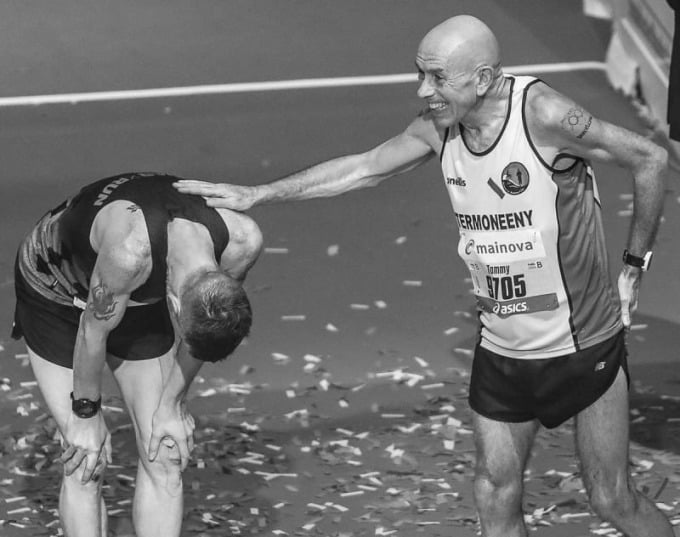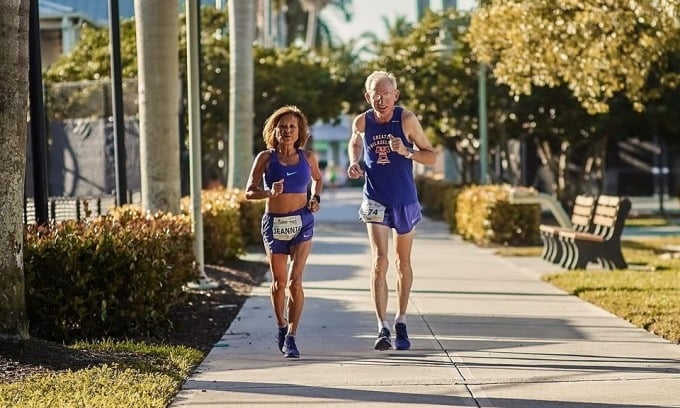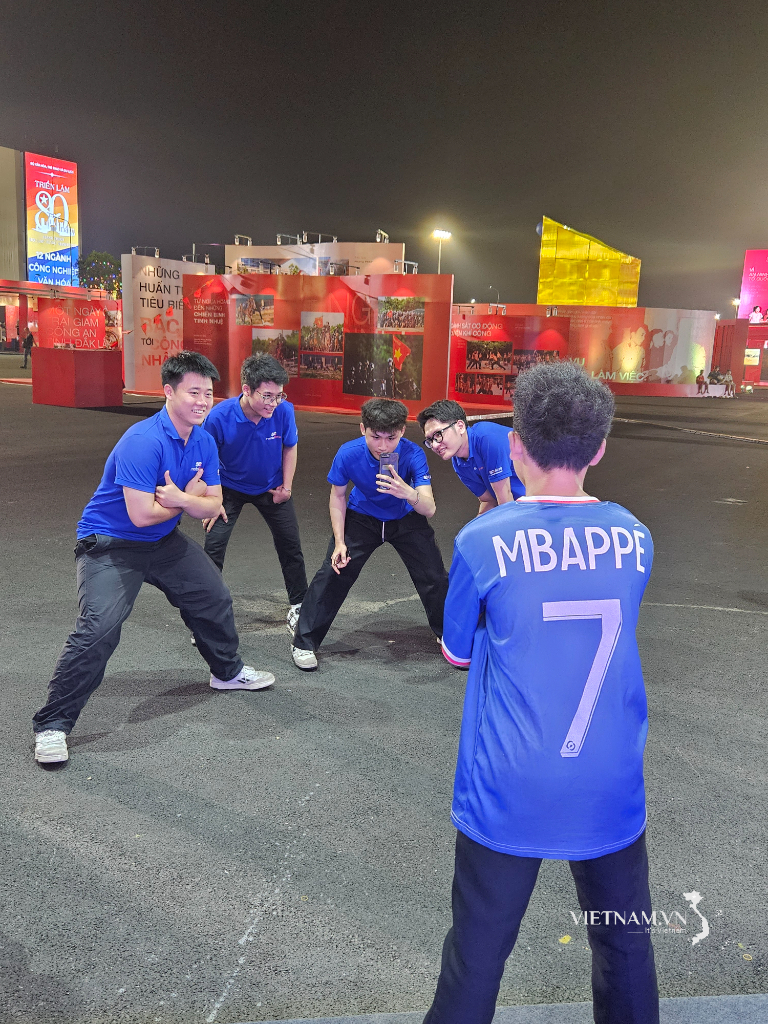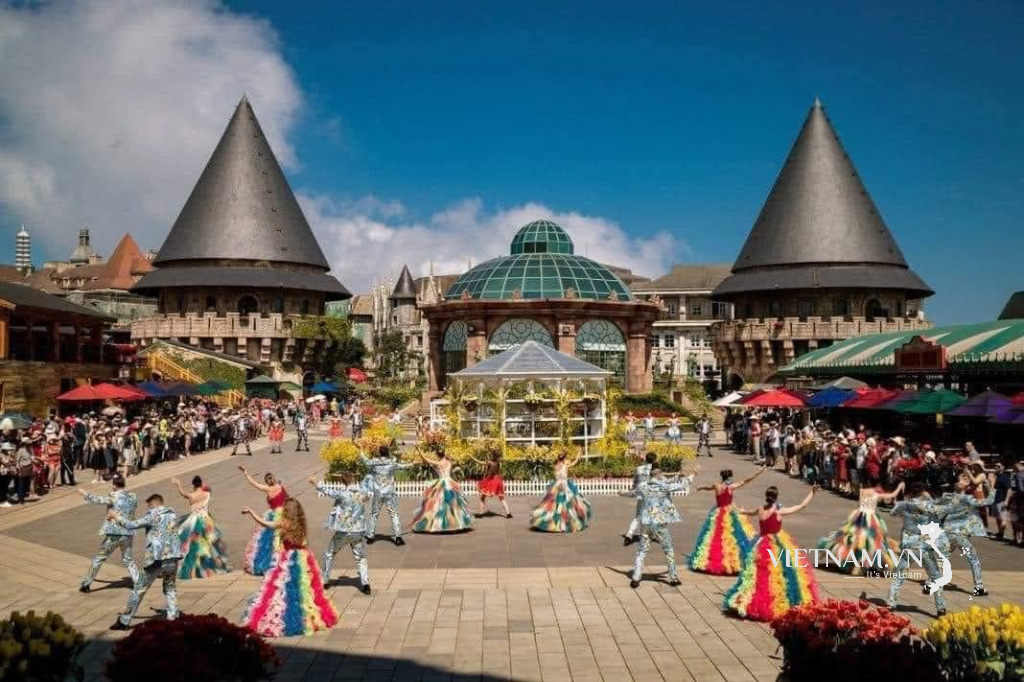Researchers at the University of Madrid, Spain, examined and analyzed the finishing times of 45,000 runners at the 2014 New York Marathon to determine the optimal age for marathon running for both men and women.
The research team examined the top 10 runners in both male and female categories, aged 18 to 75. The results showed that marathon performance declined after age 30, following a straight downward curve. Although performance did decline after age 30, this curve resembled a bell-shaped curve, meaning it initially decreased only slightly and then declined more sharply after age 55.
The "golden age" for marathon running is 27 for men and 29 for women. Marathon times slow down by 4% each year at this age for both men and women, and by 2% each year after this age for both men and women. Therefore, on average, a 27-year-old male runner who runs a marathon in 3 hours and 30 minutes will achieve a time of 3 hours, 34 minutes, and 12 seconds the following year. Meanwhile, a female runner who achieves a 3-hour time at age 29 will run in 3 hours, 2 minutes, and 36 seconds the following year.

Athlete Tommy Hughes encourages his son Eoin after finishing the Frankfurt Marathon on October 27, 2019. Photo: Derry Now
Interestingly, and somewhat surprisingly, the study showed that 18-year-old athletes had running times comparable to runners in their 60s. This result can be partly explained by the fact that 60-year-old runners have more experience in the 42.195 km distance.
The research team cited the example of Tommy Hughes, a 59-year-old Northern Irish runner who achieved a time of 2 hours, 27 minutes, and 52 seconds at the Frankfurt Marathon on October 27, 2019. He finished four minutes ahead of his 34-year-old son, Eoin, who finished in 2 hours, 31 minutes, and 30 seconds. Tommy and Eoin's combined time of 4 hours, 59 minutes, and 22 seconds set a Guinness World Record for the fastest marathon run by a father and son.
VO2 Max (Volume of Two) is also related to differences in running performance across age groups. VO2 Max is an indicator of the body's ability to utilize and metabolize oxygen during exercise. It is calculated in milliliters of oxygen per kilogram of body weight per minute (ml/kg/min). Generally, the more oxygen the body utilizes, absorbs, and metabolizes, the more energy the muscles will have for exercise. Therefore, VO2 Max is often used to reflect physical strength and endurance.
After competing in Valencia, Tommy and his son Eoin underwent various physiological tests, including VO2 Max (Volume of Two) measurements. The results showed that the father and son had nearly identical VO2 Max scores, with Tommy's at 65.4 and Eoin's at 66.9. This appears to have allowed Tommy to run the entire 42.195 km distance close to his VO2 Max.
The same applies to Gene Dykes, who ran a marathon in 2 hours, 54 minutes, and 23 seconds in 2018 at the age of 70. This means Gene Dykes ran the entire 42.195 km distance at 95% of his VO2 Max.

Gene Dykes ran alongside Jeannie Rice in a race in January 2021. Photo: Runners' World
Older runners can still perform well in marathons because they can run near their VO2 Max for extended periods. Research, titled "Long-Term Endurance Training as a Way to Combat the Burden of Age," published on the U.S. National Library of Medicine portal, points to another reason: consistent exercise can counteract the decline in VO2 Max. This means that by running consistently for decades, your VO2 Max won't decrease at the same rate as those of your peers.
This is an interesting finding. Previously, a runner's maximum VO2 was thought to decline from age 70. But the latest research shows that even as you get older, you can still maintain good endurance and fitness.
But this is just a study of one marathon. People who come to running later, train hard and persevere, can still run the fastest marathons in their 30s, 40s, 50s, or 60s. An example is Jo Schoonbroodt, a 71-year-old Belgian runner who recently set a world record for runners over 70 with a time of 2 hours 54 minutes and 19 seconds at the Maasmarathon of Vise. From Schoonbroodt's example, Runner's World concludes, "Your best, healthiest years are still ahead of you."
Hong Duy (according to Runners' World )
Source link



![[Photo] Commemorating the unwavering friendship between Vietnam and Laos](/_next/image?url=https%3A%2F%2Fvphoto.vietnam.vn%2Fthumb%2F1200x675%2Fvietnam%2Fresource%2FIMAGE%2F2026%2F01%2F27%2F1769518372051_ndo_br_1-jpg.webp&w=3840&q=75)
![[Photo] Announcement Ceremony of the Art Program “Light Concert – Welcoming the New Year 2026”](/_next/image?url=https%3A%2F%2Fvphoto.vietnam.vn%2Fthumb%2F1200x675%2Fvietnam%2Fresource%2FIMAGE%2F2026%2F01%2F27%2F1769514762857_le-cong-bo-ct-hoa-nhac-anh-sang-1772-9042-jpg.webp&w=3840&q=75)
















































![[Hightling] Conference on the Implementation of Tasks for 2026](/_next/image?url=https%3A%2F%2Fvphoto.vietnam.vn%2Fthumb%2F402x226%2Fvietnam%2Fresource%2FIMAGE%2F2026%2F01%2F27%2F1769477856197_dsc01637.jpeg&w=3840&q=75)



























![[Infographic] 10 New Administrative Procedures Regarding Unemployment Insurance](/_next/image?url=https%3A%2F%2Fvphoto.vietnam.vn%2Fthumb%2F402x226%2Fvietnam%2Fresource%2FIMAGE%2F2026%2F01%2F28%2F1769556776147_that-nghiep-2-jpg.webp&w=3840&q=75)





![OCOP during Tet season: [Part 2] Hoa Thanh incense village glows red.](/_next/image?url=https%3A%2F%2Fvphoto.vietnam.vn%2Fthumb%2F402x226%2Fvietnam%2Fresource%2FIMAGE%2F2026%2F01%2F27%2F1769480573807_505139049_683408031333867_2820052735775418136_n-180643_808-092229.jpeg&w=3840&q=75)
![OCOP during Tet season: [Part 1] Ba Den custard apples in their 'golden season'](/_next/image?url=https%3A%2F%2Fvphoto.vietnam.vn%2Fthumb%2F402x226%2Fvietnam%2Fresource%2FIMAGE%2F2026%2F01%2F26%2F1769417540049_03-174213_554-154843.jpeg&w=3840&q=75)








Comment (0)